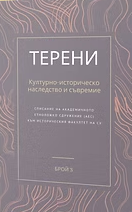Changes in Children's Play under the Influence of Popular Culture and Educational Institutions
DOI:
https://doi.org/10.60053/TER.2018.3.162-172Abstract
Playing is a natural form of human's behaviour in childhood. While playing children develop their individual characteristics and social skills. Recognising the nature of children's play, the author describes the effect public education and mass culture (television, magazines, books, etc.) have had on its development throughout the 20th century. In order to follow the process, for this article is held a research among representatives of two generations – a man and two women born in the 30's in different parts of Bulgaria and four women born in the 60's in Sofia, Bulgaria. Analysing the memories from their childhood they recreate in interviews a conclusion could be made that children who live in different social conditions (in this case – the two generations have lived their childhood in two different political and economical systems) naturally develop their games according to the social behaiviour of adults they witness in their everyday life and the influence education and mass culture have on their perception for their own place in society.
References:
Vachkov 2011: Vachkov, D. i dr., NRB ot nachaloto do kraya, IIBM, S, 2011 Vulf 2016 : Vulf, K. Antropologia na vazpitanieto. „Iztok-zapad”. S, 2016
Elenkov 2010: Elenkov, I. Daniela, K. Detstvoto pri sotsializma. izd. „Riva”. S, 2010
Ilieva 1999: Ilieva, A., Za obrednia harakter na nyakoi detski igri v Bulgaria - Balgarski folklor, kn. 3, 1999
Nemov 1994: Nemov, R.S., Psihologia, kn. 2, izd. „Prosveshtenie”, Moskva, 1994
Peev 1988: Peev, St., Detska psihologia, Vissh pedagogicheski institut, Blagoevgrad, 1988
Toshkin 2003: Toshkin, A. i dr., Treto balgarsko tsarstvo 1879-1946, izd. „Trud”, S, 2003






